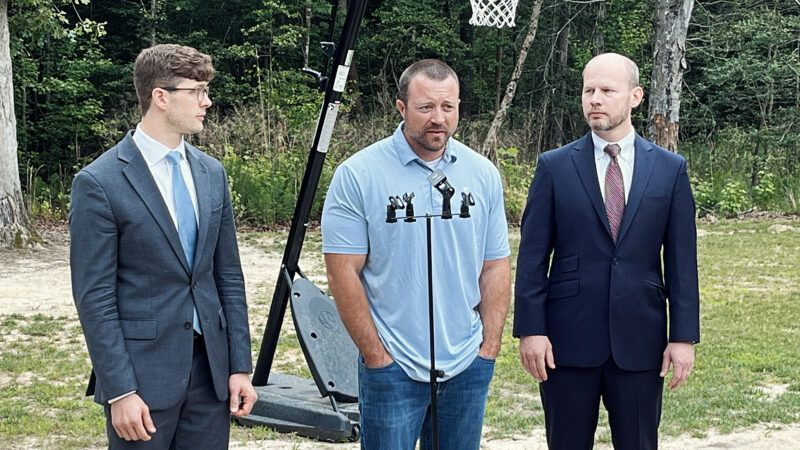Virginia Wildlife Agents Came Onto His Land and Stole His Camera. Now He's Suing.
Eight weeks ago, a camouflaged game warden came onto Josh Highlander's land, scared his son, and stole his trail camera.

In December, Reason reported that game wardens were trespassing onto private land and placing trail cameras in order to conduct surveillance—all without a warrant. In an ironic twist on that trend, a new lawsuit filed this week by the Institute for Justice (I.J.), a public interest law firm, accuses Virginia's wildlife agency of trespassing on private land and taking a trail camera.
Josh Highlander lives at the end of a quiet residential road in rural Virginia. His house sits on about 30 acres and has "No Trespassing" signs posted all around the property line. On April 8, the first day of turkey season, Highlander's wife and son were outside playing basketball. When their ball rolled toward the woods, Highlander's wife went to retrieve it—and spotted an unknown person in the trees wearing full camouflage. She rushed her son back into the house and told her husband.
Highlander rushed outside and made a circle of the property around the house but didn't see anybody. By this point, Highlander already knew that both his father and brother had encountered agents of the Virginia Department of Wildlife Resources (DWR) that day—he assumed that if the mystery guest wasn't a hunter who had gotten lost, then it was probably the DWR.
Later that night, Highlander noticed that one of his trail cameras—located about 150 yards from his house—had stopped transmitting photos. When he went out to check, he discovered the camera was gone. It was only once he contacted the county sheriff to report the camera stolen that he learned it was in the possession of the DWR, which he says has yet to contact him about it.
On June 8, Highlander held a press conference at his house with I.J. attorneys Joe Gay and Josh Windham to announce a lawsuit against the DWR for what Gay characterized as its "unconstitutional policy and practice of searching private land throughout the Commonwealth, without a warrant, and seizing private property from that land, also without a warrant."
Highlander assumes that DWR plans to search the camera's photos for evidence of hunting violations to use against him. "It doesn't seem right," he said at the press conference, "knowing that at any second, the game wardens could roll up here and ticket you based on something that they took from you,…retroactively using your property against you."
Reason has reported that wildlife agencies often trespass on private land without warrants or permission. (In one case in Connecticut, wildlife agents even attached cameras to bears in order to conduct passive surveillance.) As justification, states cite the "open fields" doctrine, in which a century of Supreme Court precedent holds that open fields contain fewer Fourth Amendment protections than a person's home and the "curtilage," the area immediately surrounding it.
Some states actually provide greater protections than the Fourth Amendment: In 2018's State v. Dupuis, the Vermont Supreme Court found that "Vermont's Constitution establishes greater protection against search and seizure of 'open fields' than the U.S. Constitution, requiring that law enforcement officers secure warrants before searching open fields when the landowner demonstrates an expectation of privacy," such as by putting up "No Trespassing" signs.
As the I.J. lawsuit states, "Article I, Section 10 of the Virginia Constitution forbids government officers from conducting warrantless fishing expeditions—roving searches and seizures of private property—in hopes of uncovering evidence against the owner." The lawsuit asks for reimbursement of Highlander's "cost and expenses," an order for the state to return his camera and destroy any photos it took or retained, and injunctions declaring the state's actions to be unconstitutional.


Show Comments (42)